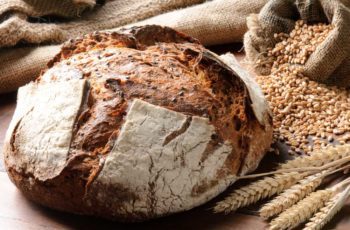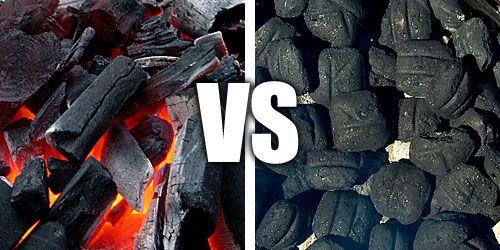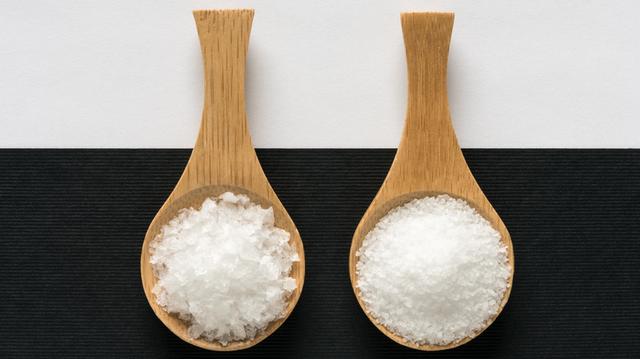
“Unlock the world of flavor with our curated selection of kosher salt brands. Elevate your culinary creations and bring out the best in every dish with these premium salts, renowned for their purity and exceptional quality. Discover a range of options that cater to different tastes and cooking styles, ensuring a delightful seasoning experience like no other. Enhance your kitchen arsenal today and embark on a journey of unparalleled taste exploration.”
Diamond Crystal Kosher Salt vs Morton: Is there a Difference?

When it comes to kosher salt, not all brands are created equal. The two most popular brands, Diamond Crystal and Morton’s, have some key differences. Diamond Crystal is preferred by purists because it contains only kosher salt with no additives or anti-caking agents. On the other hand, Morton’s is more readily available and cheaper but does contain an anti-caking agent.
The difference in density between the two brands is significant, with Morton’s being 2.09 times more dense than Diamond Crystal. This means that if a recipe calls for a certain amount of kosher salt without specifying the brand, you could potentially be under or over-salting your dish.
Diamond Crystal kosher salt is considered superior by culinary professionals due to its unique shape and sensory qualities. It is made using Cargill’s proprietary Alberger method, which creates three-dimensional pyramid/diamond-shaped flake salt with jagged edges. This shape enhances adherence to surfaces and makes it ideal for certain cooking techniques like baking vegetables or seasoning large pieces of meat.
Morton’s kosher salt, on the other hand, is created by rolling cubic salt crystals into larger flakes. While this brand is more widely available and cheaper, it may not have the same adherence properties as Diamond Crystal.
When it comes to taste, Morton’s tends to taste saltier due to its higher density. However, if you adjust your quantities based on the densities of each brand, you likely wouldn’t taste much difference between them. Some people may find Morton’s slightly bitter due to the presence of the regulated anti-caking agent.
In terms of cost and availability, Diamond Crystal tends to be more expensive and harder to find in certain regions. It has been produced in St. Clair, Michigan since 1886, but many people on the West Coast struggle to find it.
Overall, the choice between Diamond Crystal and Morton’s kosher salt depends on personal preference and cooking needs. Diamond Crystal is considered more forgiving in terms of salting dishes and has better adherence properties. Morton’s is more widely available and cheaper, making it a popular choice for many home cooks.
What is Diamond Crystal Kosher Salt?
Diamond Crystal Kosher salt is a type of kosher salt that is preferred by culinary professionals for its superior quality. It is made through Cargill’s proprietary Alberger method, which is an industrial process for producing salt from rock salt. In this process, brine is slowly heated and gently agitated in an open-pan evaporation process, allowing for the formation of three-dimensional pyramid/diamond-shaped flake salt with jagged edges.
The unique shape of Diamond Crystal kosher salt creates desirable sensory qualities for cooking. Its hollow/pyramidal/jagged shape allows it to adhere better to surfaces, making it ideal for baking vegetables, making French fries or chips, and seasoning large pieces of meat like brisket. Additionally, the shape helps to keep it suspended with other seasonings in shaker bottles when creating dry rub mixtures.
Diamond Crystal kosher salt is known for being pure and free from additives, flow agents, or anti-caking agents. This makes it a popular choice among purists who value the simplicity and natural properties of kosher salt. However, it should be noted that Diamond Crystal kosher salt can be more expensive and less readily available compared to other brands like Morton’s.
What is Morton’s Kosher Salt?
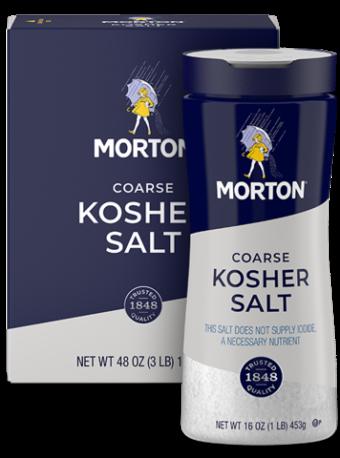
Morton’s Kosher Salt is a popular brand of kosher salt and is known for its availability and affordability. It is produced by rolling cubic salt crystals into larger flakes, creating flat-shaped crystals. Unlike Diamond Crystal, Morton’s contains an anti-caking agent called yellow prussiate of soda (sodium ferrocyanide) in regulated amounts. This anti-caking agent helps prevent the salt from clumping together.
While purists may argue that Diamond Crystal is the superior kosher salt due to its lack of additives, many home cooks and chefs still prefer using Morton’s Kosher Salt. The main reasons for this preference are availability and price. Morton’s is more readily available in most grocery stores and is usually cheaper compared to other brands of kosher salt. Additionally, some people find that Morton’s has a slightly saltier taste compared to Diamond Crystal, which can be desirable in certain recipes.
The density of Morton’s Kosher Salt is higher than that of Diamond Crystal, meaning that there is more salt per granule. This difference in density can affect the salinity level when using different brands of kosher salt in recipes. If a recipe calls for Diamond Crystal and you use Morton’s instead, you may need to reduce the amount of salt used to avoid over-salting the dish. Conversely, if a recipe calls for Morton’s and you use Diamond Crystal, you may need to increase the amount of salt used to achieve the desired level of seasoning.
The Density of These Salts
Kosher salts, such as Diamond Crystal and Morton’s, have different densities. Morton’s kosher salt is 2.09 times more dense than Diamond Crystal kosher salt. This means that for the same volume, Morton’s salt weighs more than Diamond Crystal salt. The density of Morton’s kosher salt is 1.075g/mL, while the density of Diamond Crystal kosher salt is 0.514g/mL.
The difference in density between these two salts can affect the amount of saltiness in a dish if recipes don’t specify which brand to use. If a recipe calls for a certain amount of kosher salt without specifying the brand, using Morton’s will result in a higher level of salinity compared to using Diamond Crystal. To adjust for this difference, you can use roughly half the amount of Morton’s if the recipe calls for Diamond Crystal, and double the amount of Diamond Crystal if the recipe calls for Morton’s.
The difference in taste between these two salts is not due to any additives or anti-caking agents but rather their density. Morton’s tastes saltier because its granules contain more salt per volume compared to Diamond Crystal. However, some people may find Morton’s slightly bitter due to its anti-caking agent. Additionally, Diamond Crystal has better adherence to surfaces due to its pyramid-shaped flakes with jagged edges, making it ideal for certain cooking techniques like baking vegetables or seasoning large pieces of meat.
Diamond Crystal kosher salt tends to be more expensive than Morton’s kosher salt, with a price difference of approximately 1.7 times higher. Availability can also be an issue, as Diamond Crystal may be harder to find compared to Morton’s depending on your location.
Kosher salt and table salt have different characteristics. Kosher salt enhances the flavor of food, while table salt primarily adds saltiness. The larger granules of kosher salt work well on meat and are easier to control, whereas table salt’s fine texture can make it slip through fingers and be harder to distribute evenly. Additionally, table salt is often iodized, which can leave a bitter aftertaste.
The Density of Morton’s Kosher Salt
Morton’s kosher salt has a density of 1.075g/mL. This means that for every milliliter of Morton’s kosher salt, it weighs 1.075 grams. The density measurement is obtained by weighing a 1/4 cup of Morton’s kosher salt and dividing it by the volume in milliliters.
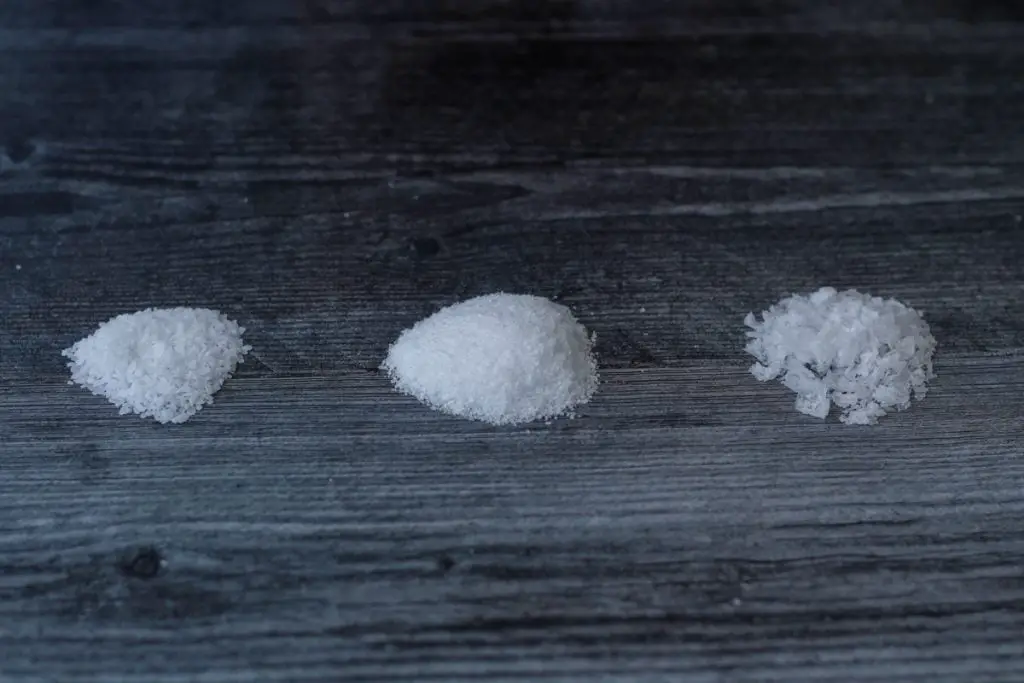
Diamond Crystal kosher salt has a density of 0.514g/mL. For every milliliter of Diamond Crystal kosher salt, it weighs 0.514 grams. The density measurement is obtained by weighing a 1/4 cup of Diamond Crystal kosher salt and dividing it by the volume in milliliters.
Morton’s table salt has a density of 1.21g/mL. This means that for every milliliter of Morton’s table salt, it weighs 1.21 grams. The density measurement is obtained by weighing a 1/4 cup of Morton’s table salt and dividing it by the volume in milliliters.
The proportion ratio between Morton’s and Diamond Crystal kosher salt is approximately 2.09x. This means that if a recipe calls for Diamond Crystal kosher salt and you only have Morton’s, you should use roughly half the amount specified in the recipe. On the other hand, if a recipe calls for Morton’s kosher salt and you only have Diamond Crystal, you should use roughly double the amount specified in the recipe.
Knowing the different densities between Morton’s and Diamond Crystal kosher salts can help adjust salinity or salt usage in cooking. If using one brand of kosher salt instead of the other, you can modify the quantity to achieve a similar level of saltiness in your dish. For example, if using Morton’s instead of Diamond Crystal, use roughly half the amount specified. Conversely, if using Diamond Crystal instead of Morton’s, use roughly double the amount specified.
The difference in taste between Morton’s and Diamond Crystal kosher salt is primarily due to their density. Morton’s tastes saltier because there is more salt in each granule compared to Diamond Crystal. However, since Diamond Crystal is less dense, it is considered more forgiving in the kitchen. This means that you are less likely to over-salt a dish when using Diamond Crystal kosher salt.
Diamond Crystal kosher salt has desirable qualities due to its shape. The pyramid/diamond-shaped flakes with jagged edges adhere better to surfaces, making it ideal for baking vegetables, making French fries or chips, and seasoning large pieces of meat like brisket. It also tends to stay suspended with other seasonings in a shaker bottle, preventing separation when creating dry rub mixtures.
Diamond Crystal kosher salt is generally more expensive than Morton’s kosher salt. The pricing may vary depending on location and retailer. Availability can also be an issue as some regions may have difficulty finding Diamond Crystal kosher salt.
Kosher salt enhances the flavor of food while table salt simply makes food taste salty. Kosher salt has larger flakes that work well on meat due to slower dissolution and increased surface area. Table salt, being finer and denser than both Morton’s and Diamond Crystal kosher salts, is harder to control and can leave a bitter aftertaste due to iodization.
The Density of Diamond Crystal Kosher Salt
Diamond Crystal kosher salt has a density of 0.514g/mL. This means that for every 59.16mL of Diamond Crystal kosher salt, it weighs approximately 30.4 grams. The density of the salt is determined by the Alberger method used by Cargill, the company that owns Diamond Crystal. This method involves heating and agitating brine in an open-pan evaporation process, resulting in pyramid-shaped crystals with jagged edges.
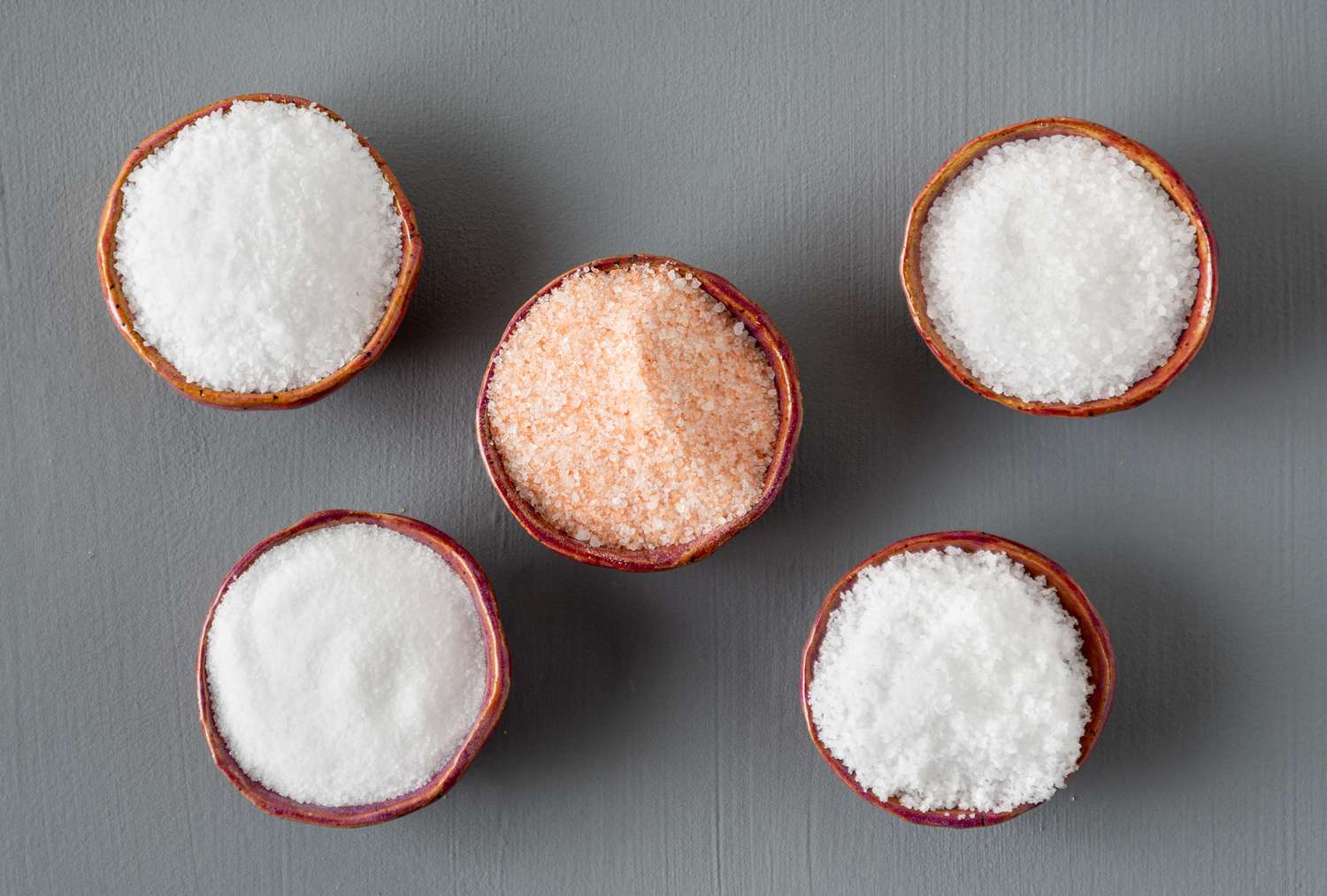
Morton’s kosher salt, on the other hand, has a density of 1.075g/mL. This makes it approximately 2.09 times more dense than Diamond Crystal kosher salt. Morton’s kosher salt is made by rolling cubic salt crystals into larger flakes and includes an anti-caking agent called yellow prussiate of soda.
The difference in density between Diamond Crystal and Morton’s kosher salts can affect how much salt you should use in a recipe. If a recipe calls for Diamond Crystal and you only have Morton’s, you should use roughly half the amount specified. Conversely, if a recipe calls for Morton’s and you only have Diamond Crystal, you should use double the amount specified.
It is important to note that while some people may find slight differences in taste between the two brands due to their densities, adjusting quantities based on density will ensure consistent seasoning without noticeable flavor differences. Additionally, Diamond Crystal’s shape with jagged edges may provide better adherence to surfaces such as when baking vegetables or seasoning large pieces of meat.
However, it is worth considering that Diamond Crystal kosher salt is significantly more expensive than Morton’s kosher salt and may not be as readily available in all locations. Therefore, personal preference and availability may influence your choice between the two brands when cooking.
The Density of Morton’s Table Salt
Morton’s table salt has a density of 1.21g/mL. This means that in every milliliter of Morton’s table salt, there is approximately 1.21 grams of salt. The density is determined by dividing the weight of the salt (71.4g) by the volume (59.16mL). This higher density compared to Diamond Crystal kosher salt contributes to its stronger and saltier taste.
The difference in densities between Diamond Crystal and Morton’s kosher salts can affect the amount of salt used in a recipe. To convert measurements between the two brands, a proportion ratio can be used. For example, if a recipe calls for 1 tablespoon of Diamond Crystal, you would use only 1/2 tablespoon of Morton’s kosher salt. Similarly, if a recipe calls for 1 cup of Morton’s kosher salt, you would need to use 2 cups of Diamond Crystal.
Many culinary professionals prefer Diamond Crystal kosher salt because it does not contain any additives or anti-caking agents. Its unique production process results in pyramid-shaped flakes with jagged edges, which adhere better to surfaces and provide desirable sensory qualities in cooking. Additionally, Diamond Crystal is considered more forgiving in terms of salting dishes since its lower density makes it less likely to over-salt a dish compared to Morton’s kosher salt.
Overall, while both brands have their own merits and uses in cooking, understanding the differences in density can help adjust salt usage accordingly and achieve desired flavors in recipes.
Actionable Data from These Findings
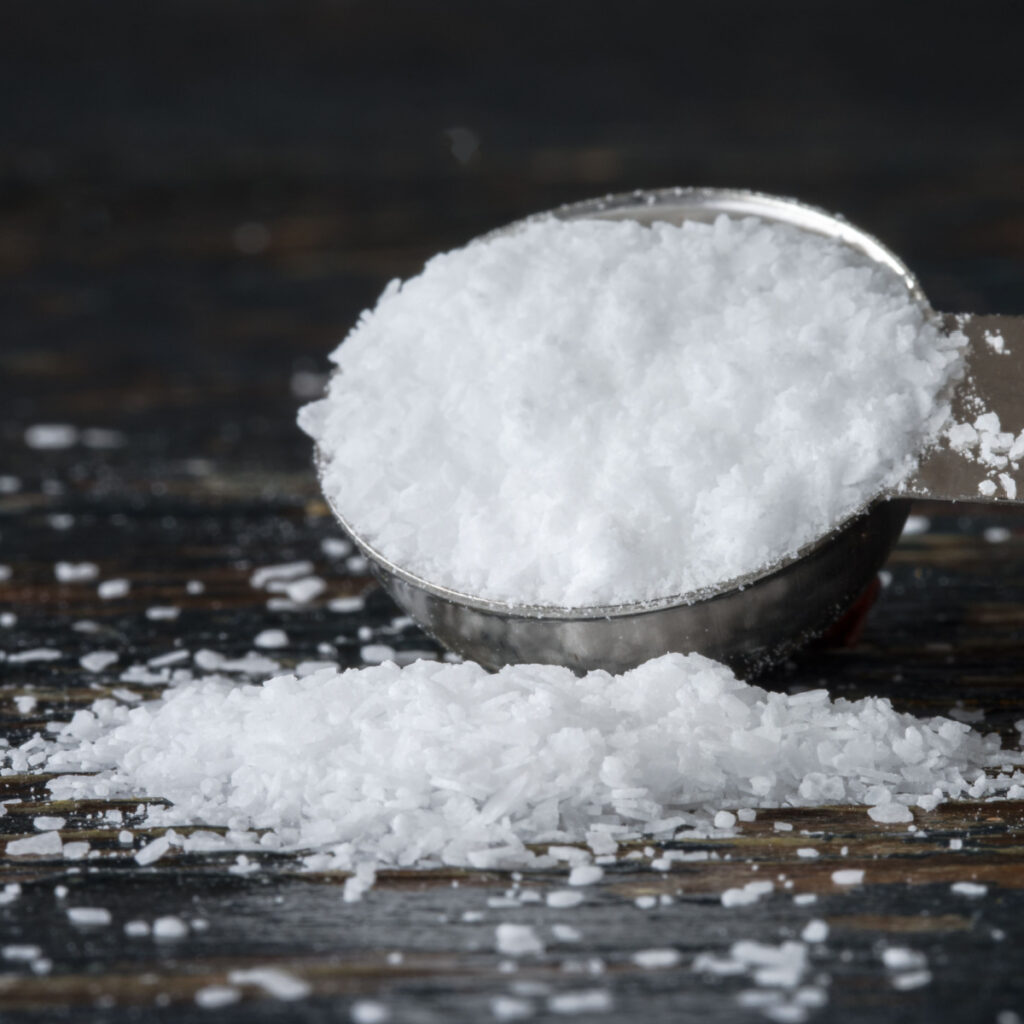
Based on the density measurements of Diamond Crystal Kosher Salt and Morton’s Kosher Salt, it is important to adjust the amount of salt used in recipes depending on the brand being used. If a recipe calls for Diamond Crystal and you only have Morton’s, use roughly half the amount of Morton’s. Conversely, if a recipe calls for Morton’s and you only have Diamond Crystal, use roughly double the amount of Diamond Crystal.
For those who prefer a less salty taste, using Diamond Crystal may be more forgiving as its lower density makes it less likely to over-salt a dish. On the other hand, Morton’s denser salt crystals may provide a slightly saltier taste due to their higher concentration in each granule.
It is also worth noting that while Diamond Crystal is considered superior by culinary professionals due to its pure kosher salt composition and desirable pyramid-shaped flakes, it is also more expensive compared to Morton’s. Therefore, cost and availability should also be taken into consideration when choosing between these two brands.
Is There a Perceivable Taste Difference?
There is a perceivable taste difference between Diamond Crystal Kosher salt and Morton’s kosher salt. This difference in taste is primarily due to the density of the salt crystals. Morton’s kosher salt, being more dense, tastes saltier compared to Diamond Crystal. However, this difference in taste is not significant enough to be easily noticeable in most dishes.
The anti-caking agent present in Morton’s kosher salt is regulated by the USDA and does not affect the overall taste significantly. Some people may find Morton’s slightly bitter, but it is not as pronounced as with iodized salt.
Overall, both Diamond Crystal and Morton’s kosher salts enhance the flavor of food effectively. Diamond Crystal is considered more forgiving in the kitchen because its lower density makes it less likely to over-salt a dish. However, Morton’s kosher salt has better adherence to surfaces due to its flatter shape, making it suitable for certain cooking techniques like baking vegetables or seasoning large pieces of meat.
In terms of cost and availability, Morton’s kosher salt is more readily available and cheaper compared to Diamond Crystal. However, if you prefer the specific qualities of Diamond Crystal or if your recipe calls for it specifically, you can adjust the quantities based on their different densities to achieve similar results.
In conclusion, while there may be a slight difference in taste between Diamond Crystal Kosher salt and Morton’s kosher salt due to their densities, it is not significant enough to drastically affect the outcome of most recipes. Both salts can be used interchangeably with some adjustments in quantity based on their densities.
Creating Dry Rub Mixtures
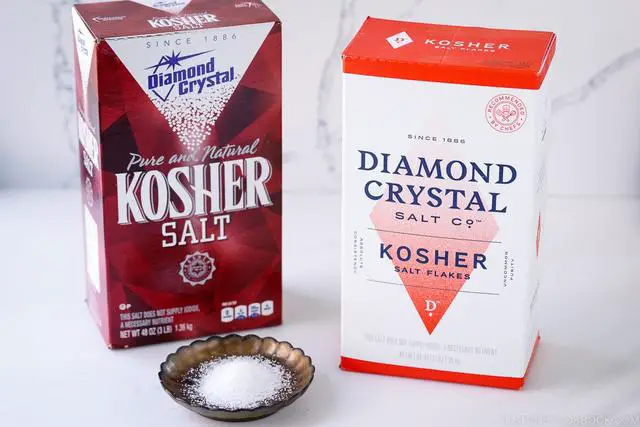
When creating dry rub mixtures, the choice of kosher salt can make a difference in the outcome. Diamond Crystal kosher salt, with its pyramid-shaped flakes and jagged edges, adheres better to surfaces. This is particularly beneficial when seasoning vegetables for baking, making French fries or chips, or seasoning large pieces of meat like brisket. The shape of Diamond Crystal salt helps it to stay suspended with other seasonings in a shaker bottle, reducing the need to constantly shake the bottle to remix the spices.
On the other hand, Morton’s kosher salt, with its flat-shaped crystals created through a rolling process, tends to dissociate from other spices when blended. It often separates itself from the mixture and requires frequent shaking of the bottle. Therefore, when using Morton’s kosher salt in dry rub mixtures, it is recommended to apply it first before other seasonings like pepper and garlic.
Overall, Diamond Crystal kosher salt’s unique shape and better adherence to surfaces make it a preferred choice for creating dry rub mixtures. However, it is worth noting that this desirable quality comes at a higher cost compared to Morton’s kosher salt.
The Price Difference
The cost of kosher salt can vary depending on the brand and where it is purchased. In general, Diamond Crystal kosher salt is more expensive than Morton’s kosher salt. At the time of updating this article (8/3/2023), Diamond Crystal kosher salt was priced at around $9.63 for a 3-pound box, while Morton’s kosher salt was priced at around $5.16 for a 26 oz container. This means that Diamond Crystal is approximately 1.7 times more expensive than Morton’s.
It is important to consider the cost when purchasing kosher salt, especially for home cooks who use it frequently in their recipes. While some people may prefer the taste and quality of Diamond Crystal, others might opt for Morton’s due to its lower price point. Additionally, availability can also be a factor, as some regions may have limited access to certain brands of kosher salt.
Overall, the price difference between Diamond Crystal and Morton’s kosher salt should be taken into account when deciding which brand to purchase for cooking needs.
What About Table Salt?
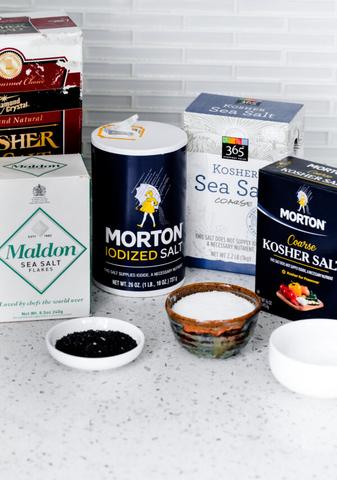
The main difference between kosher salt and regular table salt is how they enhance the flavor of food. Kosher salt enhances the taste of food, while table salt simply makes it salty. The larger size of kosher salt works well on meat because it doesn’t dissolve as quickly, allowing for better control over the seasoning. On the other hand, table salt is finer and harder to control as it slips through the fingers. Additionally, table salt is more dense than both Morton’s and Diamond Crystal kosher salts, making it less forgiving in terms of measurement.
Another factor to consider is that table salt is often iodized, which can leave a bitter aftertaste. This is why many culinary professionals prefer using kosher salt in their recipes. It’s worth noting that recipes typically call for volume measurements rather than weight, but if you’re following a recipe that specifies gram values or salinity percentages, using kosher salt can make a difference in achieving the desired taste.
In conclusion, there are several popular kosher salt brands available in the market today. Each brand offers its unique features and qualities, catering to different preferences and culinary needs. Whether you’re a professional chef or a home cook, these trusted brands provide high-quality kosher salt options that can enhance the flavor and texture of your dishes.
Learn More About Grilling
If you want to learn more about grilling, check out these other helpful resources!



